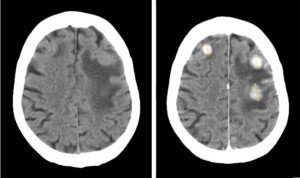Here’s an agonizing question: Would you rather your twitching muscles be caused by a brain tumor or by ALS?
Certainly you’d choose the brain tumor as a cause of muscle twitching, as this condition is not always diagnosed as terminal.
There are people out there who, over 20 years ago, were diagnosed with a brain tumor – even 30 years ago.

Several malignant masses. Credit: Jmarchn
However, there are also people – perhaps you yourself – who have somehow come to believe that a brain tumor can cause muscles to twitch.
The term “twitching” can be interpreted in different ways.
For the purpose of this article, the twitching refers to the kind of creepy-crawly sensation, or squiggling sensation, that you may feel in a muscle.
Or to put it another way, imagine the type of twitching that occurs in your eyelid happening in a larger muscle such as a hamstring, calf, arch of the foot or bicep.
So we’re not talking about trembling, tremoring, shaking or the kind of jerking that you may experience when you’re on the verge of falling asleep at night.
CAN a brain tumor, then, cause the type of muscle twitching that is commonly experienced by millions of people?
“Brain tumors can cause seizures that can even manifest as very small twitching of an extremity that can also be associated with numbness/tingling,” explains David Poulad, MD, a board certified neurosurgeon with IGEA Brain & Spine who practices in Union, NJ, whose special interests include the surgical treatment of brain tumors.
Dr. Poulad also says, “More commonly, little fasciculations in the muscle are due to electrolyte imbalances, overuse or simple fatigue.
“More commonly fibrillations/fasciculations in the muscle are due to either direct muscle injury or peripheral nerve injury and may indicate re-innervation.”
There are less serious causes of the dual symptoms of twitching muscles and numbness/tingling, and when these two symptoms seem to occur alongside each other, this doesn’t mean that they have a singular cause.
For example, carpal tunnel syndrome, a pinched nerve in the neck and low thyroid can cause a numbness and/or tingling in the fingers and fingertips.
But by chance, a benign twitching can also occur in a finger – perhaps one that’s been overused lately on the computer mouse.
“Re-innervation” simply means that the muscle cells are receiving some random electrical instructions to contract.
The “twitching” that a brain tumor might cause in a leg, for example, will not feel the same as the benign twitching you may have felt there dozens of times in the past after exercise or heavy physical activity or for no known reason.

Dr. Poulad’s clinical interests involve the surgical treatment of brain and spinal cord tumors, radiosurgery, pituitary surgery, functional neurosurgery for pain and movement disorders, and minimally invasive spine surgery.
 Lorra Garrick has been covering medical, fitness and cybersecurity topics for many years, having written thousands of articles for print magazines and websites, including as a ghostwriter. She’s also a former ACE-certified personal trainer.
Lorra Garrick has been covering medical, fitness and cybersecurity topics for many years, having written thousands of articles for print magazines and websites, including as a ghostwriter. She’s also a former ACE-certified personal trainer.
.










































